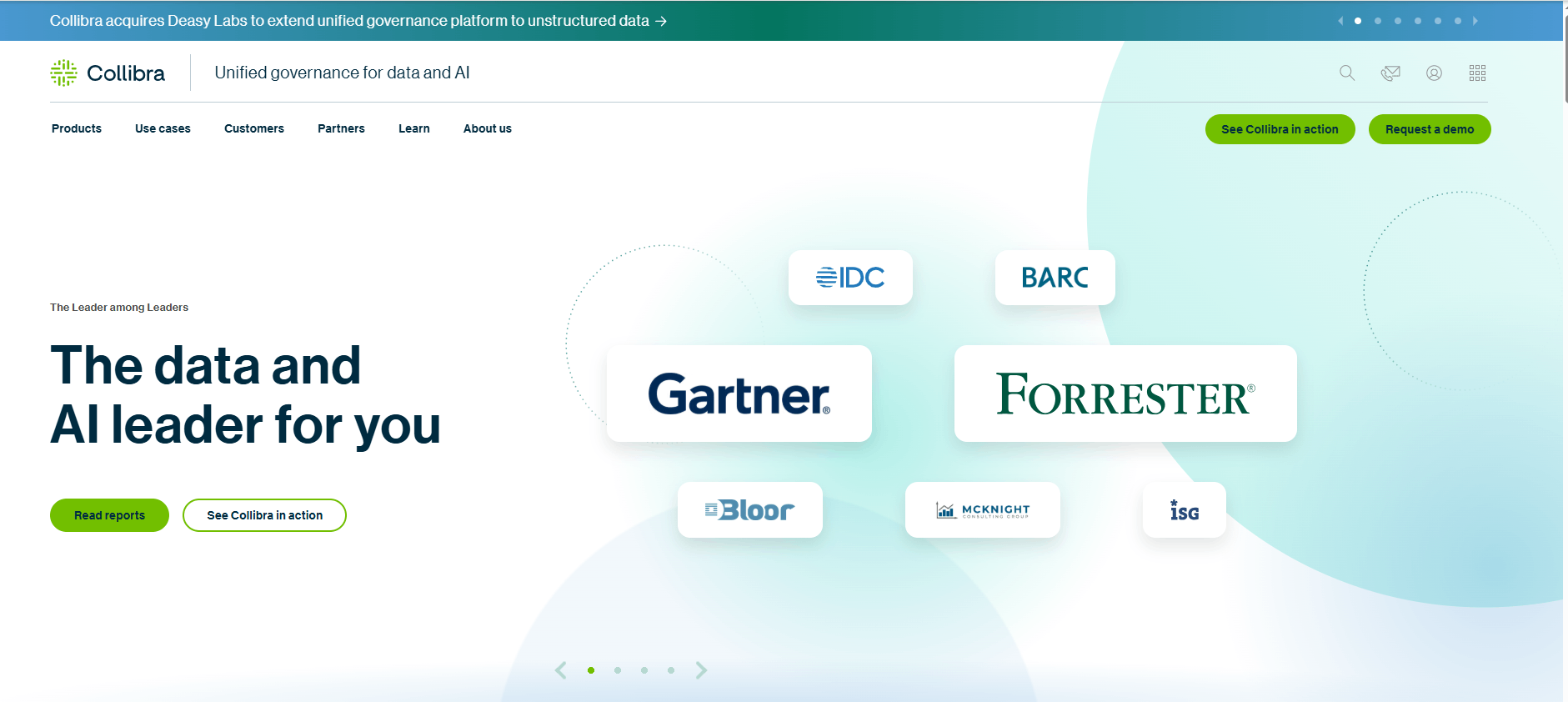
13 Data Governance Tools Worth Your Budget
Your data is a mess. You know it. Your boss knows it. The compliance team definitely knows it.
Here’s the thing: 58% of companies struggle with data management because they picked the wrong tools. They either went too cheap (hello, Excel nightmares) or too complex (looking at you, million-dollar implementations that nobody uses).
After testing dozens of platforms and analyzing real user feedback from over 10,000 professionals, we’ve identified the data governance tools that actually deliver ROI. Not promises. Not PowerPoints. Results.
Why 58% of Companies Pick the Wrong Tool
The Hidden Cost of Poor Data Management
Bad data costs the average company $12.9 million annually according to Gartner research. That’s not just from compliance fines—it’s from terrible decisions based on incorrect data, duplicate efforts across teams, and the endless hours spent manually fixing what automation should handle.
When Spreadsheets Aren’t Enough
You’ve outgrown Excel when:
-
Multiple versions of “the truth” exist across departments
-
Manual data quality checks take days, not minutes
-
Compliance audits trigger panic attacks
-
Your data lineage is “ask Sarah from accounting”
Time for real enterprise data governance tools with data lineage tracking.
1. Collibra
G2 Score: 4.2/5.0 | Starting Price: Custom Quote (typically $75K+/year)
Collibra dominates the enterprise space for a reason. Fortune 500 companies trust it because it handles complexity without breaking.
Workflow Automation That Saves Hours
Collibra’s workflow engine isn’t just fancy automation—it’s practical time-saving. One pharmaceutical client reduced their data certification process from 3 weeks to 2 days. The platform automatically routes approval requests, tracks changes, and maintains audit trails without human intervention.
The stewardship module assigns data ownership automatically based on your rules. No more “who owns this dataset?” emails.
Real ROI From Fortune 500 Companies
ING Bank reported 30% faster regulatory reporting after implementing Collibra. That’s not marketing fluff—that’s from their public case study. The bank processes millions of transactions daily and credits Collibra’s automated data quality features for maintaining their 99.7% accuracy rate.
Integration Limitations You Should Know
Here’s what Collibra won’t tell you: integration with legacy systems requires significant IT resources. Budget 3-6 months for full implementation. Small teams without dedicated data engineers will struggle.
Best for: Organizations with 500+ employees and dedicated data teams.
2. SAP Master Data Governance
G2 Score: 4.4/5.0 | Starting Price: $40K/year (SAP customers get discounts)
If you’re already in the SAP universe, MDG makes sense. If not, keep scrolling.
Seamless SAP Integration Benefits
MDG speaks native SAP. Your S/4HANA data flows directly into governance workflows without middleware. One manufacturing client consolidated 47 material master records systems into one governed source in 4 months.
The pre-built integration with SAP BW means your analytics stay consistent with governed data. No reconciliation nightmares.
Why Non-SAP Users Should Look Elsewhere
Without existing SAP infrastructure, you’re looking at:
-
6-12 month implementation
-
$200K+ in consulting fees
-
Mandatory SAP HANA database licenses
-
Training costs that exceed the software price
Hidden Costs Beyond Licensing
The real expense? SAP-certified consultants charge $250-400/hour. You’ll need them for everything from initial setup to minor configuration changes. Factor in 20% annual maintenance fees on top of licensing.
Best for: Companies already invested in SAP ecosystems needing data governance tools for regulatory compliance.
3. OvalEdge
G2 Score: 5.0/5.0 | Starting Price: $3,500/month
How does a smaller vendor achieve perfect ratings? By solving real problems without enterprise complexity.
Why Users Rate It 5.0 on G2
OvalEdge users consistently praise three things:
-
Setup in days, not months
-
Business users actually use it (85% adoption rate vs. 40% industry average)
-
Support responds in hours, not tickets
The visual data lineage alone sells it. Drag-and-drop connections show data flow from source to report—no SQL required.
Smart Features Without the Complexity
OvalEdge’s AI suggestions actually work. The platform watches your data patterns and recommends:
-
Potential data quality issues before they impact reports
-
Similar datasets that might be duplicates
-
Ownership based on usage patterns
One retail client discovered 127 duplicate customer databases in their first week. That’s $50K in saved storage costs annually.
Pricing That Makes Sense
Transparent pricing starting at $3,500/month for up to 50 users. No hidden fees. No implementation surprises. Add users for $70/month each.
Compare that to enterprise alternatives requiring six-figure commitments before you see value.
Best for: Mid-market companies wanting enterprise features without enterprise headaches.
4. Atlan
G2 Score: 4.6/5.0 | Starting Price: $10K/month
Atlan brings Slack-style collaboration to data governance. Finally, a platform data teams want to use.
Slack-Like Collaboration for Data
Atlan’s interface feels familiar because it borrows from tools your team already loves. Comment on datasets. Tag colleagues. Get notifications that matter.
The Chrome extension is genius—hover over any dashboard in Tableau or Looker to see data lineage, quality scores, and ownership. No context switching.
API-First Architecture Benefits
One fintech startup integrated their entire data stack in a weekend using Atlan’s APIs. Try that with legacy tools.
Where Atlan Falls Short
Atlan assumes modern infrastructure. If you’re running on-premise Oracle databases from 2010, look elsewhere. The platform works best with cloud-native architectures and struggles with legacy system compatibility.
Best for: Tech-forward companies with modern data stacks seeking cloud-based data governance software solutions.
5. Apache Atlas
G2 Score: 4.6/5.0 | Starting Price: Free (with catches)
Free sounds great until you calculate the real cost.
True Costs of “Free” Software
Apache Atlas is free like a puppy is free. The software costs nothing, but you’ll pay for:
-
Infrastructure to run it ($2-5K/month for production environments)
-
Engineers to maintain it (20-30 hours/month minimum)
-
Security patches you must apply yourself
-
No vendor support when things break
Netflix runs Atlas successfully—with a team of 15 engineers dedicated to the platform.
When Open Source Makes Sense
Atlas works when you have:
-
Strong engineering teams comfortable with Hadoop ecosystems
-
Existing HBase/Solr infrastructure
-
Custom requirements no vendor can meet
-
Time to build rather than buy
Uber built their entire data catalog on Atlas, but they also contributed 50+ developers to the project.
Required Technical Expertise
Your team needs:
-
Java development experience
-
Hadoop ecosystem knowledge
-
Kafka streaming expertise
-
REST API development skills
Without these, Atlas becomes an expensive science project.
Best for: Tech companies with engineering resources seeking open source data governance tools comparison winners.
6. Alation
G2 Score: 4.5/5.0 | Starting Price: $40K/year
Alation invented the modern data catalog. They’re still ahead of copycats.
Machine Learning That Actually Helps
Alation’s ML doesn’t just tag columns—it learns from user behavior. The more your team searches and queries, the smarter recommendations become.
Example: After 30 days, Alation identified that “cust_id” and “customer_identifier” were the same field across 15 different systems. It automatically suggested standardization, saving 40 hours of manual mapping.
100+ Native Connectors
Forget custom integrations. Alation connects to everything:
-
Snowflake, Redshift, BigQuery (done in minutes)
-
Tableau, PowerBI, Looker (automatic lineage tracking)
-
Slack, Teams, Jira (collaboration where work happens)
One insurance company connected 73 data sources in two weeks. The alternative? Six months of custom development.
Premium Pricing Justified?
At $40K minimum, Alation isn’t cheap. But customers report 10x ROI within year one through:
-
50% faster analyst onboarding
-
75% reduction in “where’s this data?” questions
-
90% decrease in compliance prep time
GE Healthcare credits Alation with $2M in saved productivity annually.
Best for: Data-driven organizations needing comprehensive data governance tools with metadata management.
7. Snowflake Data Governance
G2 Score: 4.4/5.0 | Included with Snowflake Enterprise ($40K minimum)
If you’re on Snowflake, their native governance features are impossible to ignore.
Zero Infrastructure Management
No servers. No patches. No maintenance windows. Snowflake handles everything.
One retail client migrated from on-premise governance tools to Snowflake and eliminated:
-
3 database administrators
-
$180K in annual infrastructure costs
-
Weekly maintenance headaches
Real-Time Data Sharing Features
Snowflake’s data sharing changes the governance game. Share governed datasets with partners instantly:
-
Automated PII masking based on viewer permissions
-
Row-level security without copies
-
Usage tracking for compliance
A pharmaceutical company shares clinical trial data with 200+ research partners. Zero data duplication. Complete audit trails.
Lock-In Risks to Consider
Here’s the catch: once you’re on Snowflake governance, leaving means:
-
Rebuilding all policies from scratch
-
Losing historical lineage data
-
Retraining your entire team
The platform is excellent, but know you’re committing long-term.
Best for: Snowflake customers wanting integrated data governance automation tools for large organizations.
8. OneTrust
G2 Score: 4.3/5.0 | Starting Price: $30K/year
OneTrust turns compliance from nightmare to manageable.
GDPR and CCPA Made Simple
OneTrust’s pre-built templates handle 90% of privacy requirements automatically:
-
Cookie consent management
-
Data subject request workflows
-
Breach notification processes
-
Privacy impact assessments
One e-commerce platform reduced GDPR compliance effort by 70% using OneTrust’s automation.
Automated Privacy Assessments
The platform scans your data infrastructure weekly and flags:
-
New personal data collections
-
Third-party sharing violations
-
Retention policy breaches
-
Cross-border transfer risks
No more manual audits. No more compliance surprises.
Beyond Basic Data Governance
OneTrust extends into:
-
Third-party risk management
-
Ethics and compliance training
-
ESG program management
-
Consent preference centers
It’s governance plus everything else legal wants.
Best for: Companies facing heavy regulatory scrutiny needing data governance tools for GDPR compliance.
9. Informatica Axon
G2 Score: 4.2/5.0 | Starting Price: $60K/year
Informatica focuses on one thing: trustworthy data.
Data Quality Scoring That Works
Axon’s quality scoring isn’t arbitrary. It measures:
-
Completeness (missing values)
-
Accuracy (validation rules)
-
Consistency (cross-system matching)
-
Timeliness (data freshness)
Scores update hourly. Dashboard alerts when quality drops below thresholds.
Business Impact Analysis
Axon shows exactly what breaks when data quality fails. One bank discovered a 0.1% error in interest calculations affected 50,000 customers and $2M in revenue.
The visual impact mapping traces problems from source to executive dashboard in seconds.
Enterprise Pricing Reality
Informatica charges enterprise prices for enterprise features:
-
$60K minimum commitment
-
Per-user pricing above 50 users
-
Professional services “strongly recommended” (add $50K)
But customers stay because it works. 92% renewal rate speaks volumes.
Best for: Financial services and healthcare needing data governance tools with data quality features.
10. DataHub
G2 Score: 4.6/5.0 | Starting Price: Free
LinkedIn open-sourced their internal data catalog. Developers rejoice.
GraphQL API for Modern Stacks
DataHub’s GraphQL API makes integration beautiful,Build custom UIs, automation, or analytics on top of DataHub’s APIs.
Real-Time Metadata Streaming
DataHub ingests metadata changes in real-time via Kafka. Schema changes, ownership updates, and lineage modifications appear instantly.
One startup built their entire data discovery portal on DataHub in 6 weeks.
Community Support vs Vendor Support
The DataHub community is active—500+ contributors, 8K+ GitHub stars. But when production breaks at 2 AM, you’re debugging alone.
LinkedIn runs DataHub at scale, but they have dedicated engineers. Consider managed offerings like Acryl Data if you need support.
Best for: Engineering-driven organizations comfortable with best free data governance tools for startups.
11. Talend Data Fabric
G2 Score: 4.3/5.0 | Starting Price: $12K/user/year
Talend combines ETL, quality, and governance in one platform.
ETL Plus Governance in One
Why buy three tools when one handles everything?
-
Data integration (1,000+ connectors)
-
Data quality (profiling and cleansing)
-
Data governance (catalog and lineage)
-
Data preparation (self-service tools)
One manufacturing company replaced 5 different tools with Talend, saving $200K annually.
Hybrid Cloud Flexibility
Run Talend anywhere:
-
On-premise for sensitive data
-
Cloud for scalability
-
Hybrid for reality
The same jobs run across environments without modification. Deploy where regulations require, scale where costs allow.
Learning Curve Considerations
Talend’s power comes with complexity. Budget for:
-
2-week training for developers
-
3-month ramp to productivity
-
Ongoing education as features expand
The platform does everything, but knowing how takes time.
Best for: Organizations wanting consolidated data governance tools integration with cloud platforms.
12. Precisely Data360
G2 Score: 4.1/5.0 | Starting Price: $25K/year
Precisely focuses on business outcomes over technical features.
Metrics That Matter to Business
Data360 translates technical metrics into business language:
-
“Data quality: 94%” becomes “Customer records ready for campaign: 47,000”
-
“Lineage complete: 100%” becomes “Financial reports fully traceable for audit”
-
“Governance coverage: 80%” becomes “Compliant datasets: 400 of 500”
Executives actually understand and care about these metrics.
Visual Impact Analysis
The platform’s Sankey diagrams show data flow beautifully. Non-technical users can trace data from entry to report without training.
One CFO called it “the first governance tool I actually understand.”
Mid-Market Sweet Spot
Precisely targets the forgotten middle—too big for spreadsheets, too small for Collibra:
-
$25K gets you started
-
Implementation in 4-6 weeks
-
Support included (not extra)
-
No army of consultants required
Best for: Mid-market companies seeking data governance tools pricing comparison winners.
13. Ataccama ONE
G2 Score: 4.5/5.0 | Starting Price: $30K/year
Ataccama automates what others require manually.
AI-Powered Data Quality
Ataccama’s AI doesn’t just detect issues—it fixes them:
-
Automatic deduplication with 98% accuracy
-
Smart standardization (turns “St.” into “Street”)
-
Anomaly detection that learns your patterns
-
Suggested fixes with confidence scores
One telecom provider reduced manual data cleaning by 80% in three months.
Multi-Cloud Deployment Options
Deploy Ataccama anywhere:
-
AWS Marketplace (one-click deployment)
-
Azure native integration
-
Google Cloud certified
-
On-premise for the paranoid
Switch clouds without rebuilding. True portability.
End-to-End Automation Benefits
Ataccama connects the entire governance lifecycle:
-
Automated data profiling on ingestion
-
Quality rules applied automatically
-
Lineage tracked without configuration
-
Compliance reports generated daily
The platform runs itself after initial setup.
Best for: Organizations prioritizing AI-powered data governance platforms with automation.
Conclusion
Choosing data governance tools isn’t about features—it’s about fit.
Start here:
- Budget under $50K? Try OvalEdge or DataHub
- Already on Snowflake? Use their native tools
- Compliance-driven? OneTrust wins
- SAP everywhere? MDG makes sense
- Engineering team available? Apache Atlas could work
- Want it all? Collibra or Informatica
Remember: the best data governance tool is the one your team will actually use. Start with a proof of concept. Measure real results. Then commit.


